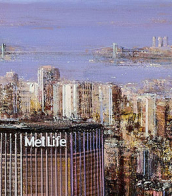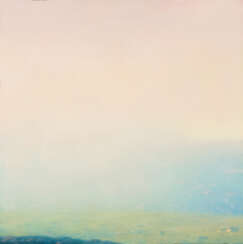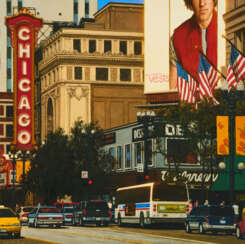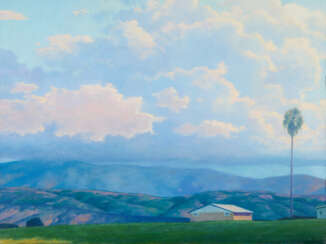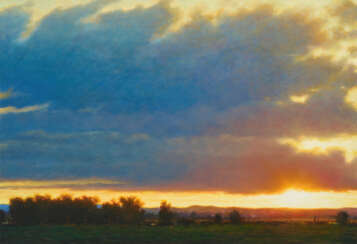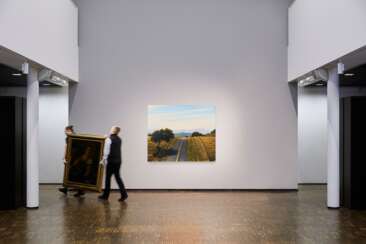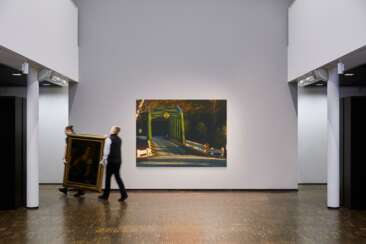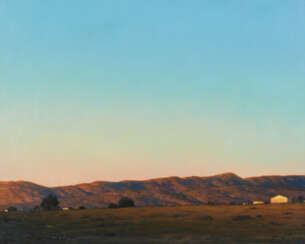William Glen Crooks (1952) — Auction price

William Glen Crooks, an American neorealist painter, has carved a niche for himself with his unique approach to landscape and urban scene painting. Unlike traditional representations, Crooks' works omit human figures, substituting them with vehicles to embody human traits and emotions. His approach to capturing the essence of city and small-town life through this lens has garnered attention for its depth and thoughtfulness. William Glen Crooks' dedication to his craft began at a young age, evolving from drawing comics to a self-taught mastery in representational painting, driven by a passion to defy the norms of modernism that dominated his formative years. His self-imposed rigorous practice of drawing laid the foundation for his distinctive style.
William Glen Crooks' work has been the subject of several exhibitions, including a notable showcase at the Oceanside Museum of Art (OMA). The exhibition, "The Point of View," marked his first museum exhibition and featured twenty-three paintings that spanned over twenty-five years. These works emphasize cityscapes, nostalgic urban scenery, and expansive landscapes, illustrating Crooks' ability to translate everyday scenes into compelling narratives. His paintings are celebrated for their illumination of light and shadow, transforming landscapes into metaphors that reflect his perceptions of the natural world.
His technique and subject matter draw inspiration from a blend of influences, including the landscape painters of the 1800s, Edward Hopper's narrative style, Mark Rothko's color fields, Wolf Kahn's liberating techniques, and John Frederick Kensett's luminism. This eclectic mix has allowed William Glen Crooks to explore the opacity of light and transparency of shadow in a way that brings a fresh perspective to the landscape genre, making his work resonate with a contemporary audience while retaining a timeless quality.
For collectors and experts in art and antiques, William Glen Crooks offers a unique investment in the realm of contemporary realism. His paintings invite viewers to explore the subtle interplay of light, shadow, and form, capturing the quiet moments of daily life with a profound depth and sensitivity.
To stay updated on William Glen Crooks' latest works and exhibitions, signing up for newsletters from galleries and museums that feature his work, such as the Oceanside Museum of Art, is recommended. This subscription will ensure that enthusiasts are always informed about new sales, auction events, and showcases related to Crooks' evolving portfolio.
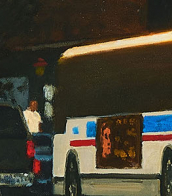

William Glen Crooks, an American neorealist painter, has carved a niche for himself with his unique approach to landscape and urban scene painting. Unlike traditional representations, Crooks' works omit human figures, substituting them with vehicles to embody human traits and emotions. His approach to capturing the essence of city and small-town life through this lens has garnered attention for its depth and thoughtfulness. William Glen Crooks' dedication to his craft began at a young age, evolving from drawing comics to a self-taught mastery in representational painting, driven by a passion to defy the norms of modernism that dominated his formative years. His self-imposed rigorous practice of drawing laid the foundation for his distinctive style.
William Glen Crooks' work has been the subject of several exhibitions, including a notable showcase at the Oceanside Museum of Art (OMA). The exhibition, "The Point of View," marked his first museum exhibition and featured twenty-three paintings that spanned over twenty-five years. These works emphasize cityscapes, nostalgic urban scenery, and expansive landscapes, illustrating Crooks' ability to translate everyday scenes into compelling narratives. His paintings are celebrated for their illumination of light and shadow, transforming landscapes into metaphors that reflect his perceptions of the natural world.
His technique and subject matter draw inspiration from a blend of influences, including the landscape painters of the 1800s, Edward Hopper's narrative style, Mark Rothko's color fields, Wolf Kahn's liberating techniques, and John Frederick Kensett's luminism. This eclectic mix has allowed William Glen Crooks to explore the opacity of light and transparency of shadow in a way that brings a fresh perspective to the landscape genre, making his work resonate with a contemporary audience while retaining a timeless quality.
For collectors and experts in art and antiques, William Glen Crooks offers a unique investment in the realm of contemporary realism. His paintings invite viewers to explore the subtle interplay of light, shadow, and form, capturing the quiet moments of daily life with a profound depth and sensitivity.
To stay updated on William Glen Crooks' latest works and exhibitions, signing up for newsletters from galleries and museums that feature his work, such as the Oceanside Museum of Art, is recommended. This subscription will ensure that enthusiasts are always informed about new sales, auction events, and showcases related to Crooks' evolving portfolio.


William Glen Crooks, an American neorealist painter, has carved a niche for himself with his unique approach to landscape and urban scene painting. Unlike traditional representations, Crooks' works omit human figures, substituting them with vehicles to embody human traits and emotions. His approach to capturing the essence of city and small-town life through this lens has garnered attention for its depth and thoughtfulness. William Glen Crooks' dedication to his craft began at a young age, evolving from drawing comics to a self-taught mastery in representational painting, driven by a passion to defy the norms of modernism that dominated his formative years. His self-imposed rigorous practice of drawing laid the foundation for his distinctive style.
William Glen Crooks' work has been the subject of several exhibitions, including a notable showcase at the Oceanside Museum of Art (OMA). The exhibition, "The Point of View," marked his first museum exhibition and featured twenty-three paintings that spanned over twenty-five years. These works emphasize cityscapes, nostalgic urban scenery, and expansive landscapes, illustrating Crooks' ability to translate everyday scenes into compelling narratives. His paintings are celebrated for their illumination of light and shadow, transforming landscapes into metaphors that reflect his perceptions of the natural world.
His technique and subject matter draw inspiration from a blend of influences, including the landscape painters of the 1800s, Edward Hopper's narrative style, Mark Rothko's color fields, Wolf Kahn's liberating techniques, and John Frederick Kensett's luminism. This eclectic mix has allowed William Glen Crooks to explore the opacity of light and transparency of shadow in a way that brings a fresh perspective to the landscape genre, making his work resonate with a contemporary audience while retaining a timeless quality.
For collectors and experts in art and antiques, William Glen Crooks offers a unique investment in the realm of contemporary realism. His paintings invite viewers to explore the subtle interplay of light, shadow, and form, capturing the quiet moments of daily life with a profound depth and sensitivity.
To stay updated on William Glen Crooks' latest works and exhibitions, signing up for newsletters from galleries and museums that feature his work, such as the Oceanside Museum of Art, is recommended. This subscription will ensure that enthusiasts are always informed about new sales, auction events, and showcases related to Crooks' evolving portfolio.


William Glen Crooks, an American neorealist painter, has carved a niche for himself with his unique approach to landscape and urban scene painting. Unlike traditional representations, Crooks' works omit human figures, substituting them with vehicles to embody human traits and emotions. His approach to capturing the essence of city and small-town life through this lens has garnered attention for its depth and thoughtfulness. William Glen Crooks' dedication to his craft began at a young age, evolving from drawing comics to a self-taught mastery in representational painting, driven by a passion to defy the norms of modernism that dominated his formative years. His self-imposed rigorous practice of drawing laid the foundation for his distinctive style.
William Glen Crooks' work has been the subject of several exhibitions, including a notable showcase at the Oceanside Museum of Art (OMA). The exhibition, "The Point of View," marked his first museum exhibition and featured twenty-three paintings that spanned over twenty-five years. These works emphasize cityscapes, nostalgic urban scenery, and expansive landscapes, illustrating Crooks' ability to translate everyday scenes into compelling narratives. His paintings are celebrated for their illumination of light and shadow, transforming landscapes into metaphors that reflect his perceptions of the natural world.
His technique and subject matter draw inspiration from a blend of influences, including the landscape painters of the 1800s, Edward Hopper's narrative style, Mark Rothko's color fields, Wolf Kahn's liberating techniques, and John Frederick Kensett's luminism. This eclectic mix has allowed William Glen Crooks to explore the opacity of light and transparency of shadow in a way that brings a fresh perspective to the landscape genre, making his work resonate with a contemporary audience while retaining a timeless quality.
For collectors and experts in art and antiques, William Glen Crooks offers a unique investment in the realm of contemporary realism. His paintings invite viewers to explore the subtle interplay of light, shadow, and form, capturing the quiet moments of daily life with a profound depth and sensitivity.
To stay updated on William Glen Crooks' latest works and exhibitions, signing up for newsletters from galleries and museums that feature his work, such as the Oceanside Museum of Art, is recommended. This subscription will ensure that enthusiasts are always informed about new sales, auction events, and showcases related to Crooks' evolving portfolio.


William Glen Crooks, an American neorealist painter, has carved a niche for himself with his unique approach to landscape and urban scene painting. Unlike traditional representations, Crooks' works omit human figures, substituting them with vehicles to embody human traits and emotions. His approach to capturing the essence of city and small-town life through this lens has garnered attention for its depth and thoughtfulness. William Glen Crooks' dedication to his craft began at a young age, evolving from drawing comics to a self-taught mastery in representational painting, driven by a passion to defy the norms of modernism that dominated his formative years. His self-imposed rigorous practice of drawing laid the foundation for his distinctive style.
William Glen Crooks' work has been the subject of several exhibitions, including a notable showcase at the Oceanside Museum of Art (OMA). The exhibition, "The Point of View," marked his first museum exhibition and featured twenty-three paintings that spanned over twenty-five years. These works emphasize cityscapes, nostalgic urban scenery, and expansive landscapes, illustrating Crooks' ability to translate everyday scenes into compelling narratives. His paintings are celebrated for their illumination of light and shadow, transforming landscapes into metaphors that reflect his perceptions of the natural world.
His technique and subject matter draw inspiration from a blend of influences, including the landscape painters of the 1800s, Edward Hopper's narrative style, Mark Rothko's color fields, Wolf Kahn's liberating techniques, and John Frederick Kensett's luminism. This eclectic mix has allowed William Glen Crooks to explore the opacity of light and transparency of shadow in a way that brings a fresh perspective to the landscape genre, making his work resonate with a contemporary audience while retaining a timeless quality.
For collectors and experts in art and antiques, William Glen Crooks offers a unique investment in the realm of contemporary realism. His paintings invite viewers to explore the subtle interplay of light, shadow, and form, capturing the quiet moments of daily life with a profound depth and sensitivity.
To stay updated on William Glen Crooks' latest works and exhibitions, signing up for newsletters from galleries and museums that feature his work, such as the Oceanside Museum of Art, is recommended. This subscription will ensure that enthusiasts are always informed about new sales, auction events, and showcases related to Crooks' evolving portfolio.
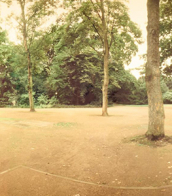

William Glen Crooks, an American neorealist painter, has carved a niche for himself with his unique approach to landscape and urban scene painting. Unlike traditional representations, Crooks' works omit human figures, substituting them with vehicles to embody human traits and emotions. His approach to capturing the essence of city and small-town life through this lens has garnered attention for its depth and thoughtfulness. William Glen Crooks' dedication to his craft began at a young age, evolving from drawing comics to a self-taught mastery in representational painting, driven by a passion to defy the norms of modernism that dominated his formative years. His self-imposed rigorous practice of drawing laid the foundation for his distinctive style.
William Glen Crooks' work has been the subject of several exhibitions, including a notable showcase at the Oceanside Museum of Art (OMA). The exhibition, "The Point of View," marked his first museum exhibition and featured twenty-three paintings that spanned over twenty-five years. These works emphasize cityscapes, nostalgic urban scenery, and expansive landscapes, illustrating Crooks' ability to translate everyday scenes into compelling narratives. His paintings are celebrated for their illumination of light and shadow, transforming landscapes into metaphors that reflect his perceptions of the natural world.
His technique and subject matter draw inspiration from a blend of influences, including the landscape painters of the 1800s, Edward Hopper's narrative style, Mark Rothko's color fields, Wolf Kahn's liberating techniques, and John Frederick Kensett's luminism. This eclectic mix has allowed William Glen Crooks to explore the opacity of light and transparency of shadow in a way that brings a fresh perspective to the landscape genre, making his work resonate with a contemporary audience while retaining a timeless quality.
For collectors and experts in art and antiques, William Glen Crooks offers a unique investment in the realm of contemporary realism. His paintings invite viewers to explore the subtle interplay of light, shadow, and form, capturing the quiet moments of daily life with a profound depth and sensitivity.
To stay updated on William Glen Crooks' latest works and exhibitions, signing up for newsletters from galleries and museums that feature his work, such as the Oceanside Museum of Art, is recommended. This subscription will ensure that enthusiasts are always informed about new sales, auction events, and showcases related to Crooks' evolving portfolio.


William Glen Crooks, an American neorealist painter, has carved a niche for himself with his unique approach to landscape and urban scene painting. Unlike traditional representations, Crooks' works omit human figures, substituting them with vehicles to embody human traits and emotions. His approach to capturing the essence of city and small-town life through this lens has garnered attention for its depth and thoughtfulness. William Glen Crooks' dedication to his craft began at a young age, evolving from drawing comics to a self-taught mastery in representational painting, driven by a passion to defy the norms of modernism that dominated his formative years. His self-imposed rigorous practice of drawing laid the foundation for his distinctive style.
William Glen Crooks' work has been the subject of several exhibitions, including a notable showcase at the Oceanside Museum of Art (OMA). The exhibition, "The Point of View," marked his first museum exhibition and featured twenty-three paintings that spanned over twenty-five years. These works emphasize cityscapes, nostalgic urban scenery, and expansive landscapes, illustrating Crooks' ability to translate everyday scenes into compelling narratives. His paintings are celebrated for their illumination of light and shadow, transforming landscapes into metaphors that reflect his perceptions of the natural world.
His technique and subject matter draw inspiration from a blend of influences, including the landscape painters of the 1800s, Edward Hopper's narrative style, Mark Rothko's color fields, Wolf Kahn's liberating techniques, and John Frederick Kensett's luminism. This eclectic mix has allowed William Glen Crooks to explore the opacity of light and transparency of shadow in a way that brings a fresh perspective to the landscape genre, making his work resonate with a contemporary audience while retaining a timeless quality.
For collectors and experts in art and antiques, William Glen Crooks offers a unique investment in the realm of contemporary realism. His paintings invite viewers to explore the subtle interplay of light, shadow, and form, capturing the quiet moments of daily life with a profound depth and sensitivity.
To stay updated on William Glen Crooks' latest works and exhibitions, signing up for newsletters from galleries and museums that feature his work, such as the Oceanside Museum of Art, is recommended. This subscription will ensure that enthusiasts are always informed about new sales, auction events, and showcases related to Crooks' evolving portfolio.
